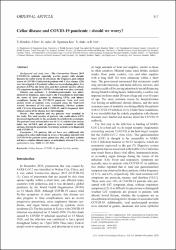| dc.contributor.author | Gökden, Y. | en_US |
| dc.contributor.author | Hot, S. | en_US |
| dc.contributor.author | Adas, M. | en_US |
| dc.contributor.author | Koç Öğütmen, Deniz | en_US |
| dc.contributor.author | Atak, S. | en_US |
| dc.contributor.author | Hot, Ayşe Begüm | en_US |
| dc.date.accessioned | 2021-01-26T10:29:26Z | |
| dc.date.available | 2021-01-26T10:29:26Z | |
| dc.date.issued | 2020 | en_US |
| dc.identifier.citation | Künye girilecek | en_US |
| dc.identifier.issn | 1784-3227 | |
| dc.identifier.uri | https://hdl.handle.net/20.500.12294/2562 | |
| dc.description.abstract | Background and study aims : The Coronavirus Disease 2019 (COVID-19) epidemic especially worries people with chronic diseases the entire world. In this study, the frequency, and clinical course of COVID-19 infection in patients with Celiac disease (CD) were investigated. CD patients' adherence to purchasing gluten free products (GFPs), the strict diet, and how patients' anxiety affects CD symptoms during the COVID-19 outbreak were also examined.Patients and methods : A detailed-questionnaire was administered by telephone, and e-mail to the CD patients to determine the status of these patients in obtaining GFPs, and dietary compliance during the COVID-19 pandemic. State and trait anxiety levels of patients were evaluated using the State-trait Anxiety Inventory- (STAI) scale. Additionally, whether patients with CD were diagnosed with COVID-19, and if diagnosed, their clinical course of the disease were investigated.Results : One hundred and one patients were included in the study. The total number of patients who could obtain GFPs decreased significantly in the pandemic than before the pandemic. The patients' state anxiety index was 40.7 +/- 7.9, and the trait anxiety index was 44.5 +/- 8.5, and all patients were evaluated as mildly anxious. During the pandemic, two female patients were diagnosed with COVID-19.Conclusion : CD patients did not have any additional risk compared to other individuals in terms of becoming infected with COVID-19 for patients under gluten free diet, and these patients will have a similar clinical course as individuals without CD. | en_US |
| dc.language.iso | eng | en_US |
| dc.publisher | Univ Catholique Louvain-UCL | en_US |
| dc.relation.ispartof | Acta Gastro-Enterologica Belgica | en_US |
| dc.rights | info:eu-repo/semantics/openAccess | en_US |
| dc.subject | Celiac Disease | en_US |
| dc.subject | COVID-19 | en_US |
| dc.subject | Gluten Free Diet | en_US |
| dc.subject | Anxiety | en_US |
| dc.title | Celiac disease and COVID-19 pandemic : should we worry? | en_US |
| dc.type | article | en_US |
| dc.department | Fen-Edebiyat Fakültesi, Psikoloji Bölümü | en_US |
| dc.identifier.volume | 83 | en_US |
| dc.identifier.issue | 4 | en_US |
| dc.identifier.startpage | 517 | en_US |
| dc.identifier.endpage | 525 | en_US |
| dc.relation.publicationcategory | Makale - Uluslararası Hakemli Dergi - Kurum Öğretim Elemanı | en_US |


















